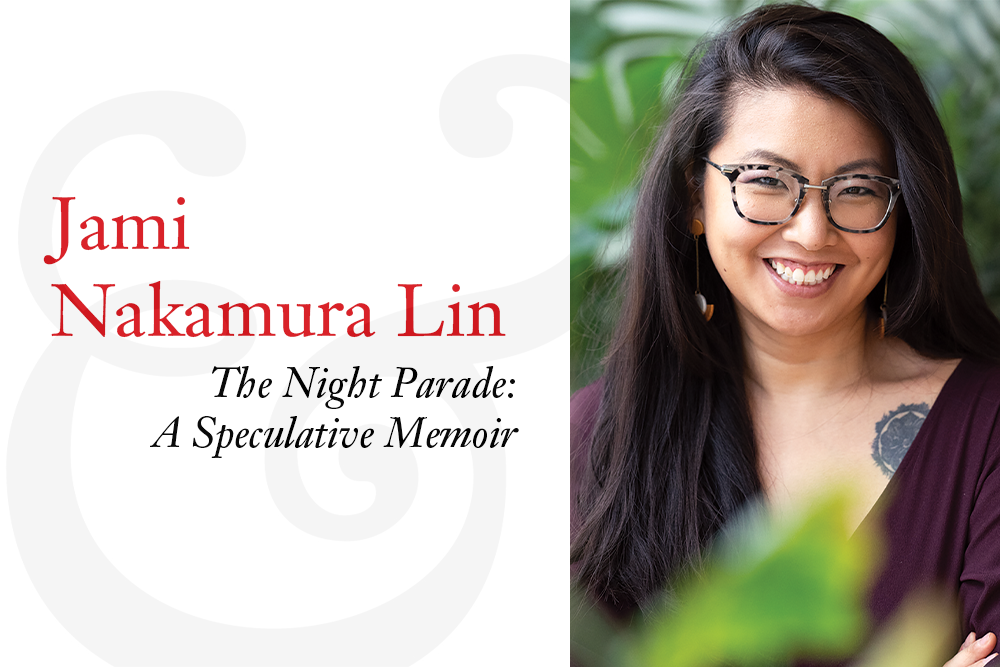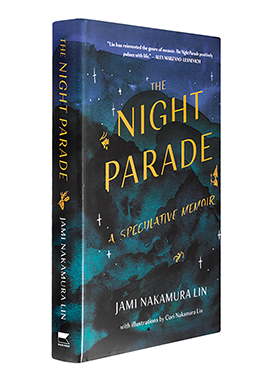The Night Parade: A Speculative Memoir (Mariner Books, October), a genre-bending memoir, divided into the four acts of a traditional Japanese narrative structure and illustrated by the author’s sister, that reckons with Lin’s adolescence, marked by an undiagnosed bipolar disorder, as well as the death of her father, and interrogates the notion of recovery, fear, and grief to answer the question of how we learn to live with the things that haunt us. Agent: Stephanie Delman of Trellis Literary Management. Editor: Jessica Williams. First Lines: “Listen—
In the presence of a story—if the story is a good one—time collapses.
This is why I am always telling it.
———
Once upon a time, long, long ago, my people knew a fundamental truth: the sea was coming for them. It was not their enemy—as island folk, much of their livelihood depended on fishing—but it was not their friend. The ocean was honored with the kind of reverence that looks a lot like fear.” (Credit: Ananda Lima)
![]()
The only way I was able to write The Night Parade was by spending so much time not writing it. My writing process is inextricable from my bipolar, my ADHD/neurodivergence, and my fatigue. My writing, in both form and content, from style to syntax to schedule, is mapped by that terrain.
In some ways this book came early; in others it came late. From the time I was in kindergarten I knew I wanted to be a writer, and I wrote the first version of this “book proposal” when I was in high school. I finished my MFA thesis, an essay collection about mental illness, when I was twenty-four, ten years ago. I thought that would be my first book. And yet when I graduated I was so sick of writing about myself that I put it away and threw myself into a different project—a speculative novel based on yōkai, these spirits and monsters of Japanese legend. I started this in 2014 and worked on it constantly for the next three years, which culminated in a funded four-month research fellowship in Japan. I thought that would be my first book.
While there I found out my father was dying, and for the most part I stopped writing. I was stuck in the throes of grief and new motherhood. Toward the end of 2019, I started wanting to process his death and my bipolar disorder—the things that haunt me, the things I live with every day. I tried so many times to write, but I couldn’t, until I started using yōkai and other creatures of Japanese, Taiwanese, and Okinawan folklore as a lens. I started to blur the line between the world of these monsters and my own; this researched backbone gave me something to turn to when my own personal narrative felt like too much.
In 2020 I wrote six installments of an essay column called “The Monster in the Mirror” at Catapult. Between that and a piece in the New York Times, I started to have a few agents reach out to me, and I signed with my agent in December 2020. The next couple of months were a whirlwind of creating the proposal and adding Cori’s illustrations to the book. In February 2021 my book sold at auction, and I spent the rest of the year completing the first draft. The next year was spent revising with my editor.
Writing about such difficult topics was frequently overwhelming for me. Specific chapters—particularly one about my worst bipolar episode—never felt right. At some point between the second and the third edit, my editor gave the general note that I should lean into the weirdness—that reality wasn’t my strong suit. This gave me the permission to really embrace the speculative elements. I asked myself, How can I make this chapter about the most depressing time of my life entertaining for me? How can I not hate writing it? And so I made it about time travel! And portals! I wrote some chapters in third person and some in second and some in first, some in past tense and some in present. I made those choices out of necessity because it was the only way I could write.
I have to follow where the energy is: both in my excitement and my literal energy, which is minimal. (I wrote almost the entire book from bed.) But I believe in letting things go fallow. My garden produces better when we let the land take a break. I put something away when I’m tired—like my MFA thesis a decade ago. I could have tried to publish my story then, but it needed a decade to ferment, to transform completely into the book it is now.
Book photos by David Hamsley.










